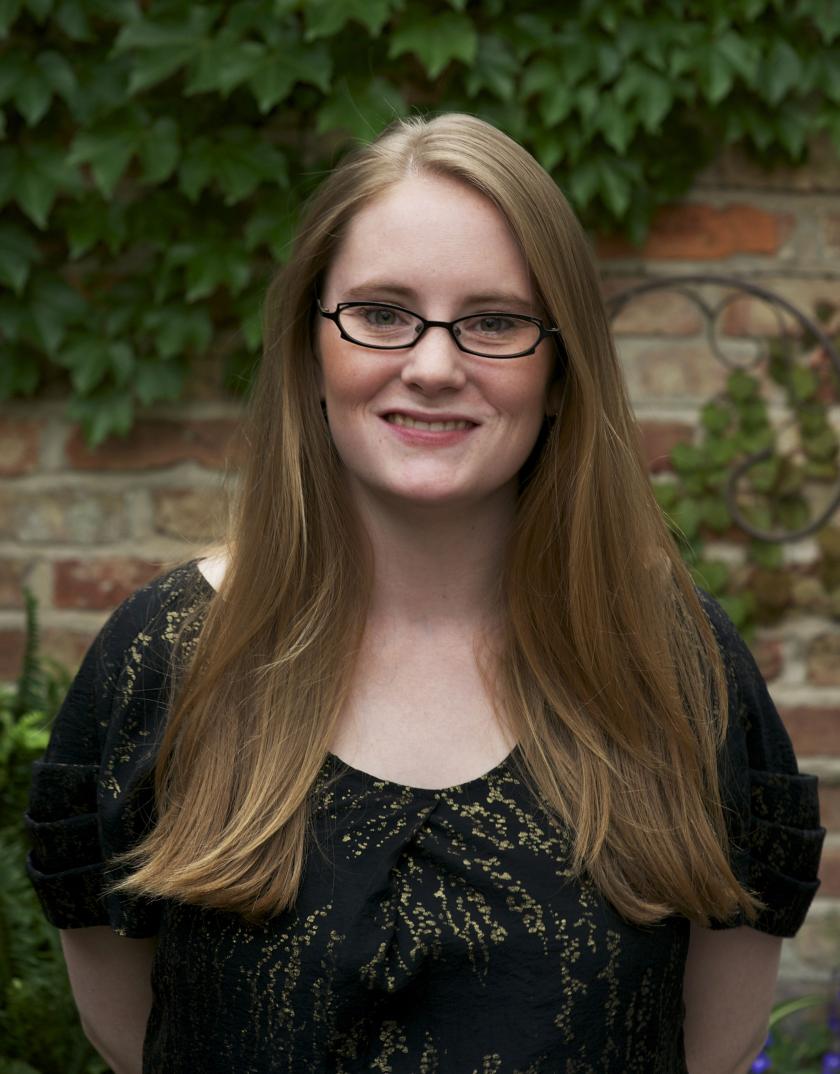
“There is nothing more fun, synergistic, and fulfilling than to have a patron who is ready to dig in, excited about what they are doing, and cannot wait to tell you all about it.”
 Maggie Cusick’s (MS ’11) interest in special collections began during her time as an art history major at DePaul University. After visiting DePaul’s Special Collections and Archives Department for a class, Maggie fell in love with historical materials. She connected with the documents as objects of both art and history. “It was fascinating to me,” she recalls, “that this book or letter that was written hundreds of years ago was still right here in front of me and was evidence of the life of that person.” She was able to secure a position there as a student worker and spoke to members of the department about their educational backgrounds. This experience brought her to GSLIS.
Maggie Cusick’s (MS ’11) interest in special collections began during her time as an art history major at DePaul University. After visiting DePaul’s Special Collections and Archives Department for a class, Maggie fell in love with historical materials. She connected with the documents as objects of both art and history. “It was fascinating to me,” she recalls, “that this book or letter that was written hundreds of years ago was still right here in front of me and was evidence of the life of that person.” She was able to secure a position there as a student worker and spoke to members of the department about their educational backgrounds. This experience brought her to GSLIS.
Maggie took numerous special collections courses at GSLIS. She feels that within the program options, there was a great balance between more “contextual” courses such as History of the Book and more “practical” or skill-building ones such as Bookbinding or Preservation that focus on everyday issues of methods and procedures. One of her favorite classes, Planning, Production, and Practice of Library and Museum Exhibitions, taught by Professor and Director of the Rare Book and Manuscript Library Valerie Hotchkiss, integrated the contextual with the practical. Each student had to design a mock exhibit of 15 to 20 rare items. Maggie focused her exhibit on Irish song and dance tune collections. She had to physically see each item, write the catalog and label text, and plan public programming to complement the exhibit. She presented material from the late eighteenth century through the twentieth. One such item was a compilation by Captain Francis O’Neill, an Irish immigrant in Chicago who, at the turn of the century, saved thousands of traditional tunes by writing them down as Chicago Irish musicians played. When Maggie first encountered the Newberry Library’s copy of O’Neill’s seminal volume, she felt awed to be in the presence of a work that she had grown up hearing about. It was a powerful moment, and it made her feel connected to others who had studied it in the past. She noticed that one of the pages still has traces of candle wax.
Maggie wanted to gain skills and insight into many areas where special collections work and academic librarianship intersect, so in addition to classwork she sought out opportunities at the University of Illinois and in the greater Urbana-Champaign area. She obtained a graduate assistantship for two years in the Ricker Library of Architecture and Art, and she also spent time as a student worker and volunteer in the University’s Rare Book & Manuscript Library, at the Champaign County Historical Archives, at the Urbana Free Library, and in the University’s Visual Resources Center.
After graduation, Maggie moved back to Chicago to work at the Newberry Library. She serves as a library assistant for general collections, which involves interaction with patrons and colleagues, which she loves. She is responsible for acclimating patrons to the library, retrieving requested materials, and answering basic reference questions. She also helps to maintain the Newberry’s open and closed stacks.
Last summer, Maggie worked as an intern for the Department of Local and Family History at the Newberry. She feels privileged to be able to continue some of those duties at her current job. She edits and updates guides and pathfinders, helps maintain the local and family history open shelves, assists with aspects of the genealogy blog, and answers reference correspondence. Maggie is fascinated with studying her own genealogy, so it is satisfying for her to help other researchers with their own family puzzles.
Maggie credits the MBMS Certificate in Special Collections with highlighting behind-the-scenes issues that a patron may not be aware of: security, access policies, donor policies, environmental conditions, and conservation. These are issues that she deals with every day in her position at the Newberry Library. “It is not all about having fun with pretty old books or letters or diaries or photographs,” she acknowledges. “Now, I understand the full picture of what goes into managing such a collection and balancing preservation and access."